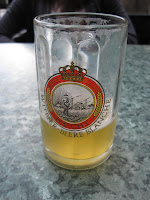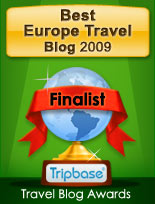
When you move back home after living in a foreign country, you're bound to experience culture shock. For me, this often involves weeks of remarking on the simple pleasures, maddening differences, and random realities of my old new home. Everything has a certain novelty to it - I can pay for things in dollars! The sidewalks are dog poo-free! - and I start rediscovering my home country the way I previously discovered my adoptive one. Freshly back from Brussels, here are some of the things I'm noticing about life in the U.S.
1. Friendly people are everywhere.It started with the Customs and Border Protection Officer who chatted me up while stamping my passport. Then there was the cab driver who asked me about my trip and talked to me about everything from the recent snowstorms to the pros and cons of a GPS system. The cashier at Target gave me a beaming smile and asked if I found everything alright. Not to mention the woman I sat next to on the plane who became my best friend in a little under eight hours. After six months of living with guarded Belgians, I'm in awe of the openness and friendly nature of Americans.
2. Where are all the boots?Belgian women wear boots. French women too, for that matter. In fact, once summer turned to fall it was hard to spot women who weren't wearing ankle, mid-calf or knee-high versions of
les bottes. But in Washington, DC, such footwear is few and far between.
3. I'm no longer a human pinball.In addition to generally being a friendly bunch, Americans have the incredible ability to walk without running into each other. Wandering the streets of Brussels should be considered a contact sport, as people who could easily alter their path to avoid bowling you over simply choose not to. Here in the U.S., this morning's crowded rush hour commute on metro didn't result in me getting hip-checked by random strangers. Amazing!
4. American television commercials are obnoxious.Ok, so I didn't have to move overseas to figure this one out. However, renewed exposure to U.S. advertising only reinforces my belief that the best thing to do during a commerical break is to hit "mute."
5. Everything is big, new, and clean.After living in Brussels, with its narrow, winding streets, dirty sidewalks, and buildings that date back to the 1600s, everything here feels spacious, fresh, and modern. I love Europe's historic atmosphere, but I think U.S. modernity is pretty cool as well.
6. There is this thing called "the sun."The amount of cloud cover Brussels receives is truly impressive. I'm still not quite sure what to make of that shiny thing up in the DC sky, but I think I like it.
 Needless to say, I was beyond excited to try New York City's own frites shop, conveniently located one block from my former apartment. I ordered a regular sized cone with ketchup and Irish curry sauce for dipping, and tucked in for what I hoped would be a delicious afternoon snack. Instead, I got "blah." The frites didn't taste Belgian at all. They were too dense, too large, and not nearly crispy enough. I would call them "steak fries," which can be tasty, but are most definitely not what you find at a Belgian friterie.
Needless to say, I was beyond excited to try New York City's own frites shop, conveniently located one block from my former apartment. I ordered a regular sized cone with ketchup and Irish curry sauce for dipping, and tucked in for what I hoped would be a delicious afternoon snack. Instead, I got "blah." The frites didn't taste Belgian at all. They were too dense, too large, and not nearly crispy enough. I would call them "steak fries," which can be tasty, but are most definitely not what you find at a Belgian friterie. 














